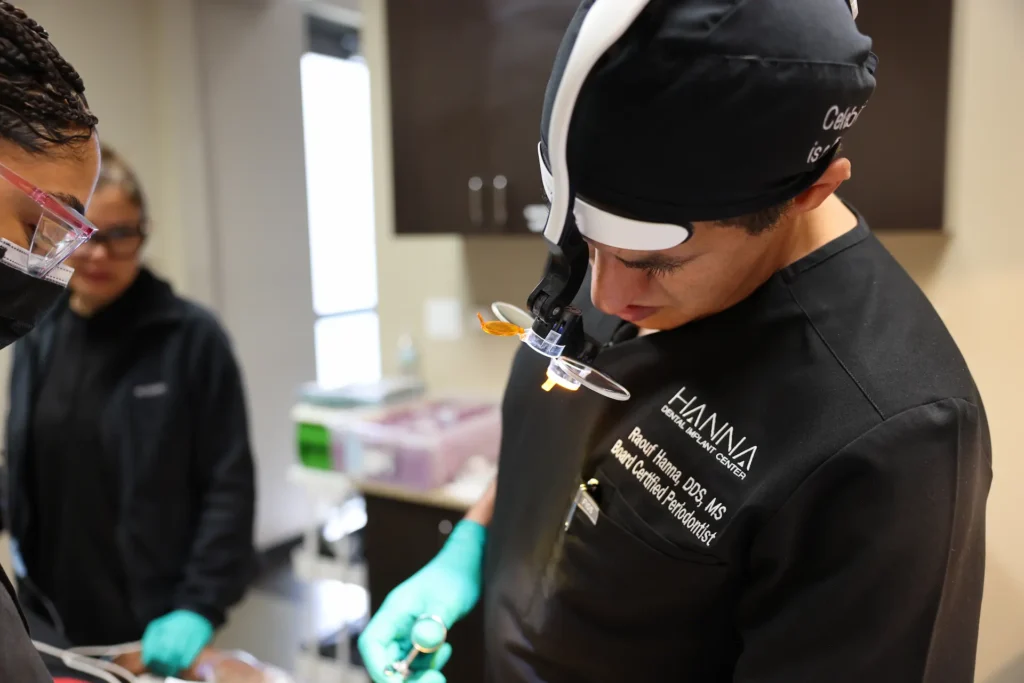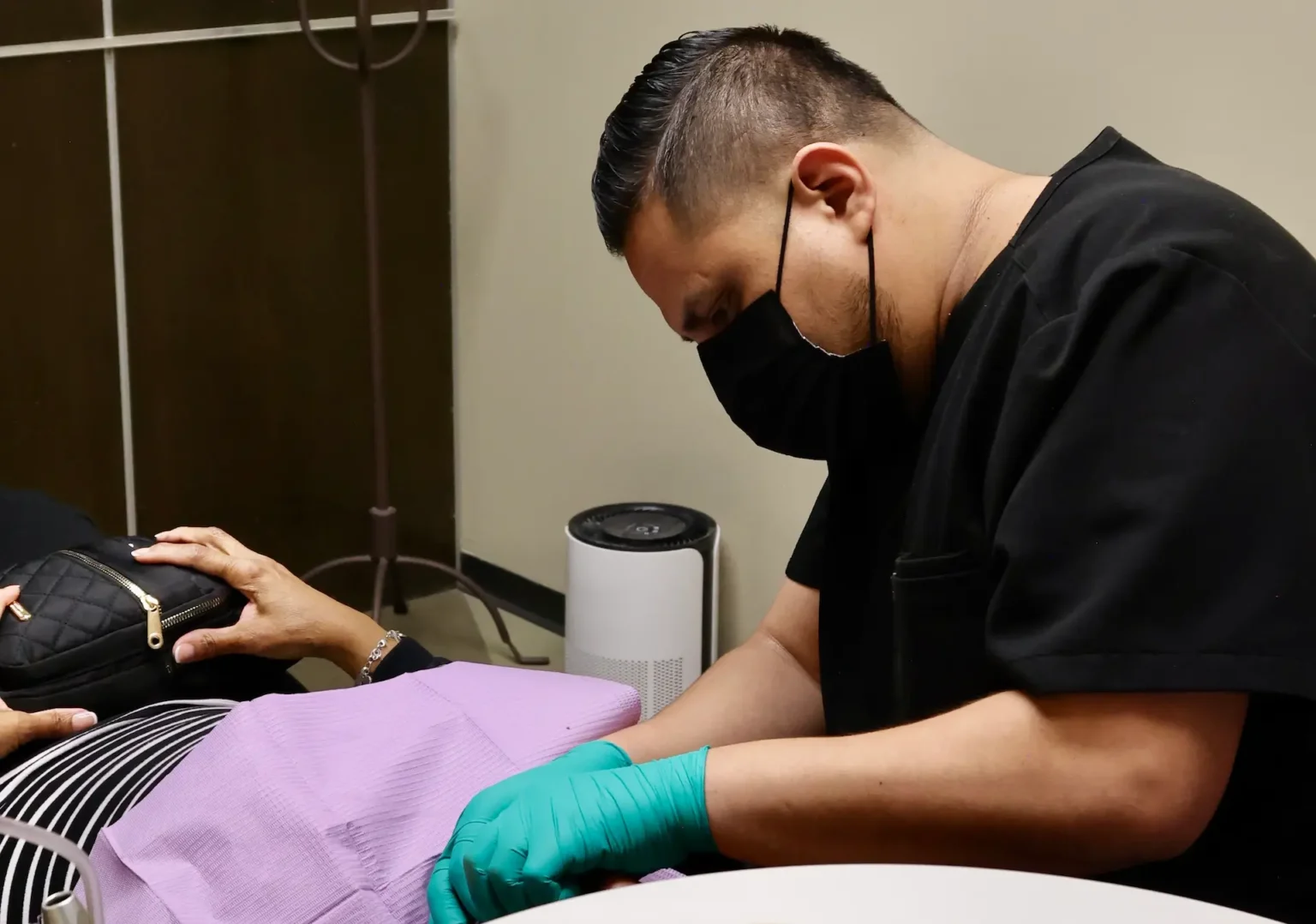If you’re living with celiac disease, you already know how important it is to avoid gluten. But did you know that this autoimmune condition may also damage your teeth?
Many people with celiac disease suffer from enamel problems, chronic dry mouth, and a higher risk of cavities, sometimes even before they’re diagnosed. Understanding how gluten sensitivity affects your oral health can help you take action early and avoid long-term damage.
Let’s break down how celiac disease impacts your teeth, what to watch out for, and how Hanna Dental can help restore your smile when things go wrong.
The Impact of Celiac Disease on Tooth Enamel
One of the earliest signs of celiac disease may show up in your mouth, not your gut. People with celiac often suffer from problems such as weak, discolored, or pitted enamel that makes teeth more vulnerable to decay.
According to the National Institute of Diabetes and Digestive and Kidney Diseases (NIDDK), gluten exposure in people with celiac disease can lead to an immune response that damages tooth enamel, especially during development in childhood.
That means people with undiagnosed or untreated celiac disease may grow up with weakened enamel that’s more likely to wear down, chip, or stain. Even adults can develop enamel issues over time due to ongoing nutritional deficiencies.
These enamel defects can’t be reversed but they can be restored. At Hanna Dental, we offer advanced solutions to help restore your smile to its full potential.
Why Celiac Disease Increases the Risk of Cavities
Celiac disease can make you more prone to cavities, and not just because of enamel defects. This condition also interferes with your ability to absorb critical nutrients like calcium and vitamin D, both of which play a major role in maintaining strong, healthy teeth.
Low calcium levels lead to weak tooth enamel, a common cause of tooth decay. Combine that with enamel irregularities and poor saliva production, and you’ve got a perfect storm for plaque buildup, bacteria growth, and painful cavities.
While good brushing and flossing habits are always essential, people with celiac may need to go the extra mile. If you’ve noticed signs of tooth decay or have frequent dental issues, your condition could be playing a bigger role than you think.
Dry Mouth and Its Effect on Oral Health in Celiac Disease
Another common yet overlooked symptom of celiac disease is dry mouth (xerostomia). Without enough saliva, your mouth loses its natural ability to fight bacteria, wash away food particles, and protect enamel from acid.
This makes it easier for cavities and gum disease to take hold and harder for your mouth to heal from irritation or infection. If your mouth constantly feels dry or sticky, or you’re dealing with bad breath despite good hygiene, dry mouth could be the culprit.
To manage this, we recommend using the best enamel mouthwash for dry mouth and switching to gluten free toothpaste if you haven’t already. These small steps, combined with regular dental visits, can make a major difference.
How Gluten-Free Diets Affect Dental Health
Once diagnosed, most people with celiac start a gluten-free diet. While that’s a big win for your gut and overall health, going gluten-free doesn’t automatically fix the dental damage already done.
In fact, some gluten-free foods are highly processed and may lack important nutrients for tooth health. Others may have higher sugar content, which increases the risk of tooth decay. That’s why it’s essential to be strategic about your oral care after diagnosis.
We recommend using gluten-free dental products designed for people with sensitivities. These are less likely to trigger reactions and can help prevent future enamel damage.
Maintaining Dental Health with Celiac Disease: Tips and Solutions

Managing celiac disease is already a full-time job—but your teeth need just as much attention. Here are a few practical steps to keep your mouth healthy:
- Brush with gluten-free, enamel-safe toothpaste.
- Use alcohol-free, remineralizing mouthwash.
- Stay hydrated to combat dry mouth.
- Get regular dental checkups—early detection is key.
- Monitor your nutrient intake, especially calcium and vitamin D.
If your teeth have already suffered damage, whether from weak enamel or untreated cavities, Hanna Dental offers dental restoration and implant services tailored to your needs. From natural-looking crowns to full-mouth reconstructions, our team is here to help you restore your smile and your confidence.
Don’t Let Celiac Steal Your Smile
Celiac disease doesn’t just affect your gut, it can have lasting effects on your teeth. From enamel defects and dry mouth to an increased risk of cavities, the oral health challenges are real. But with the right care, the damage doesn’t have to have a lasting impact on your smile.
At Hanna Dental, we understand the unique dental needs of patients with celiac disease. Whether you need preventive care, restorative treatment, or long-term implant solutions, we’re here to help.
FAQ
Can celiac disease affect your teeth?
Yes. Celiac disease can cause enamel defects, increase the risk of cavities, lead to dry mouth, and result in chronic oral health problems.
What are the signs of celiac disease in the mouth?
Look for enamel defects (discoloration, pits), frequent cavities, dry mouth, and recurring canker sores.
What do celiac teeth look like?
They may appear yellow, translucent, or streaked with white or brown. In some cases, teeth may be pitted or irregularly shaped due to weak enamel.


